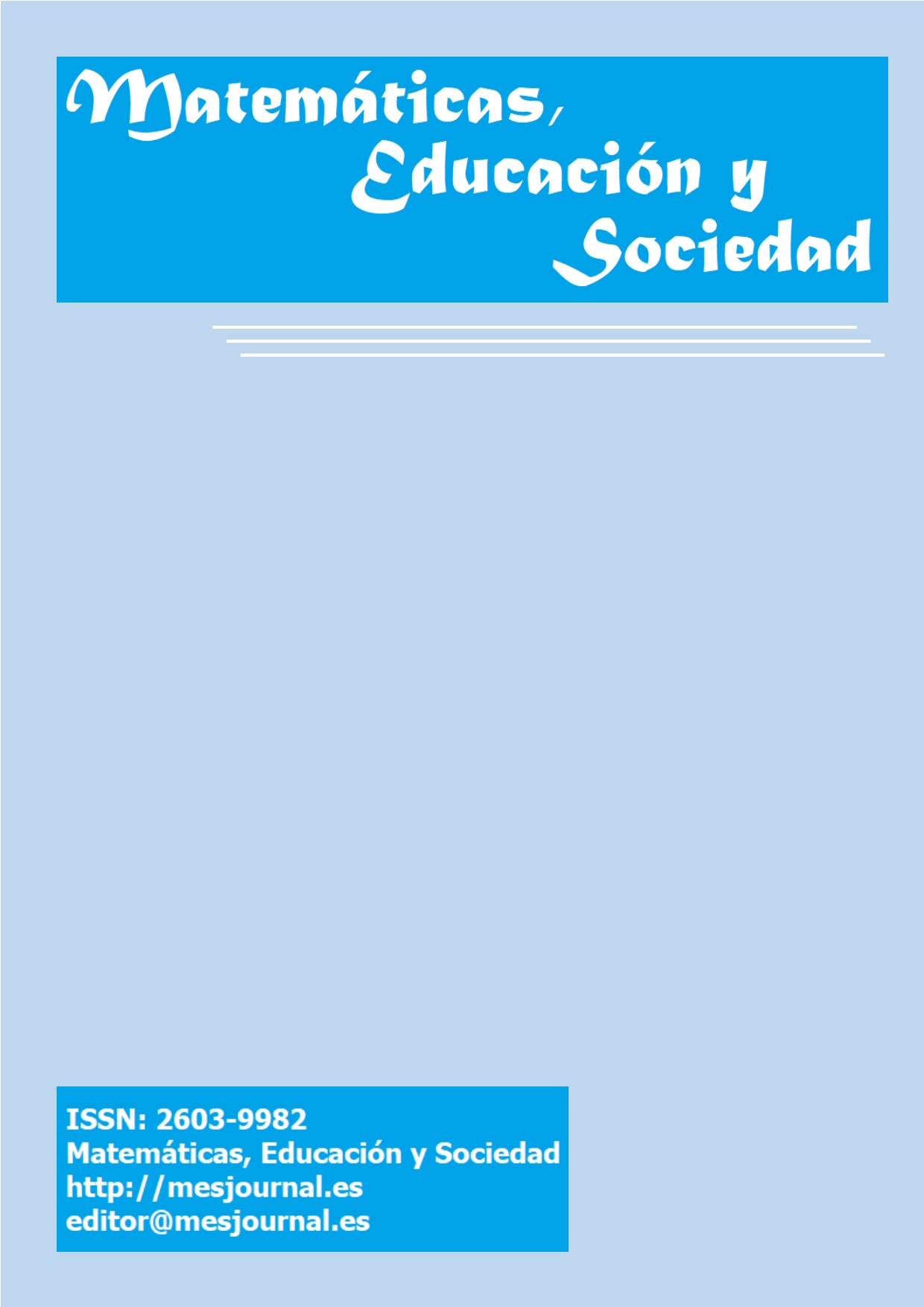Math Problem solving errors regarding Change and Combine situations in K-7 Primary Students
Main Article Content
Abstract
We hereby present a piece of enquiry focused on the identification of the difficulties that pupils face regarding problems solving in situations that require change and combine, and, more precisely, on the detection of the errors made in such process. Samely, we aim to determine whether there is any relation between gender and type of error. This study is exploratory in nature and applies a set of already validated problems. Findings show that pupils make more error in Change problems tan in Combine problems. The most frequent error is that they turn to mathematical operations of either addition or subtraction, choosing the corresponding opposite operation.
Downloads
Download data is not yet available.
Article Details
How to Cite
Del Rosal Pedrajas, A., Gutiérrez Arenas, M. P., & Maz-Machado, A. (2018). Math Problem solving errors regarding Change and Combine situations in K-7 Primary Students. Mathematics, Education and Society, 1(1), 22–31. Retrieved from https://journals.uco.es/mes/article/view/12829
Section
Artículos
This work is licensed under a Creative Common License (CC BY 3.0 ES)
References
Blanco, O. y Blanco, L. (2009). Contextos y estrategias en la resolución de problemas de primaria. Números, 71, 75-85.
Carpenter, T. P. y Moser, J. M. (1983). The acquisition of addition and subtraction concepts. En R. Lesh y M. Landau (Eds.), Acquisition of mathematics: concepts and processes (pp. 7-44). New york: Academic Press.
Carrillo J. (1996). Modos de resolver problemas y concepciones sobre la matemática y su enseñanza de profesores de matemáticas de alumnos de más de 14 años (Tesis Doctoral). Sevilla: Universidad de Sevilla.
Casajús, A. (2005). La resolución de problemas aritmético-verbales por alumnos con Déficit de Atención con Hiperactividad (TDAH) (Tesis Doctoral). Universidad de Barcelona.
Castro, E. (1995). Niveles de comprensión en problemas verbales de comparación multiplicativa. Tesis doctoral. Granada: Comares.
Castro, E. (2008). Resolución de problemas: ideas, tendencias e influencias en España. En Investigación en educación matemática XII (p. 6). Sociedad Española de Investigación en Educación Matemática, SEIEM.
Castro, E., Rico, L. y Gil,. F. (1991). Enfoques de investigación en problemas verbales aritméticos aditivos. Enseñanza de las Ciencias, 10(3), 243-253.
Fucson, K. (1992). Research on whole number adition and subtraction. En D. A: Grows (ed.) Handbook of research on mathematics teaching and learning (pp. 243-275). New York: MacMillan.
Gagné, R. (1979): Las condiciones del aprendizaje. México, Interamericana.
Heller, J. y Greeno, J. (1978). Semantic processing of arithmetic Word problema solving. Anual Meeting of the Midwestern Psychological Association. Chicago.
Lester, F. K. (1983). Trends and issues in mathematical problem solving research. En R. Lesh y M. Landau (Eds.), Acquisitions of mathematics concepts and processes. London: Academy Press.
Ley Orgánica 2/2006, de 3 de mayo, de Educación. Boletín Oficial del Estado, num. 106, de 4 de mayo de 2006, pp. 17158 a 17207. Recuperado de https://www.boe.es/boe/dias/2006/05/04/pdfs/A17158-17207.pdf
Ley Orgánica 8/2013, de 9 de diciembre, para la mejora de la calidad educativa. Boletín Oficial del Estado, num. 295, de 10 de diciembre de 2013, pp. 97858 a 97921. Recuperado de https://www.boe.es/boe/dias/2013/12/10/pdfs/BOE-A-2013-12886.pdf
Puig, L. y Cerdan, F. (1988). Problemas aritméticos escolares. Madrid. Síntesis.
Verschaffel, L. y De Corte, E. (1993). A decade of research on word problem solving in Leuven: Theoretical, methodological, and practical outcomes. Educational Psychology Review, 5(3), 239-256.
Verschaffel, L., & De Corte, E. (1996). Number and arithmetic. En International handbook of mathematics education (pp. 99-137). Dordrecht: Springer.
Carpenter, T. P. y Moser, J. M. (1983). The acquisition of addition and subtraction concepts. En R. Lesh y M. Landau (Eds.), Acquisition of mathematics: concepts and processes (pp. 7-44). New york: Academic Press.
Carrillo J. (1996). Modos de resolver problemas y concepciones sobre la matemática y su enseñanza de profesores de matemáticas de alumnos de más de 14 años (Tesis Doctoral). Sevilla: Universidad de Sevilla.
Casajús, A. (2005). La resolución de problemas aritmético-verbales por alumnos con Déficit de Atención con Hiperactividad (TDAH) (Tesis Doctoral). Universidad de Barcelona.
Castro, E. (1995). Niveles de comprensión en problemas verbales de comparación multiplicativa. Tesis doctoral. Granada: Comares.
Castro, E. (2008). Resolución de problemas: ideas, tendencias e influencias en España. En Investigación en educación matemática XII (p. 6). Sociedad Española de Investigación en Educación Matemática, SEIEM.
Castro, E., Rico, L. y Gil,. F. (1991). Enfoques de investigación en problemas verbales aritméticos aditivos. Enseñanza de las Ciencias, 10(3), 243-253.
Fucson, K. (1992). Research on whole number adition and subtraction. En D. A: Grows (ed.) Handbook of research on mathematics teaching and learning (pp. 243-275). New York: MacMillan.
Gagné, R. (1979): Las condiciones del aprendizaje. México, Interamericana.
Heller, J. y Greeno, J. (1978). Semantic processing of arithmetic Word problema solving. Anual Meeting of the Midwestern Psychological Association. Chicago.
Lester, F. K. (1983). Trends and issues in mathematical problem solving research. En R. Lesh y M. Landau (Eds.), Acquisitions of mathematics concepts and processes. London: Academy Press.
Ley Orgánica 2/2006, de 3 de mayo, de Educación. Boletín Oficial del Estado, num. 106, de 4 de mayo de 2006, pp. 17158 a 17207. Recuperado de https://www.boe.es/boe/dias/2006/05/04/pdfs/A17158-17207.pdf
Ley Orgánica 8/2013, de 9 de diciembre, para la mejora de la calidad educativa. Boletín Oficial del Estado, num. 295, de 10 de diciembre de 2013, pp. 97858 a 97921. Recuperado de https://www.boe.es/boe/dias/2013/12/10/pdfs/BOE-A-2013-12886.pdf
Puig, L. y Cerdan, F. (1988). Problemas aritméticos escolares. Madrid. Síntesis.
Verschaffel, L. y De Corte, E. (1993). A decade of research on word problem solving in Leuven: Theoretical, methodological, and practical outcomes. Educational Psychology Review, 5(3), 239-256.
Verschaffel, L., & De Corte, E. (1996). Number and arithmetic. En International handbook of mathematics education (pp. 99-137). Dordrecht: Springer.

